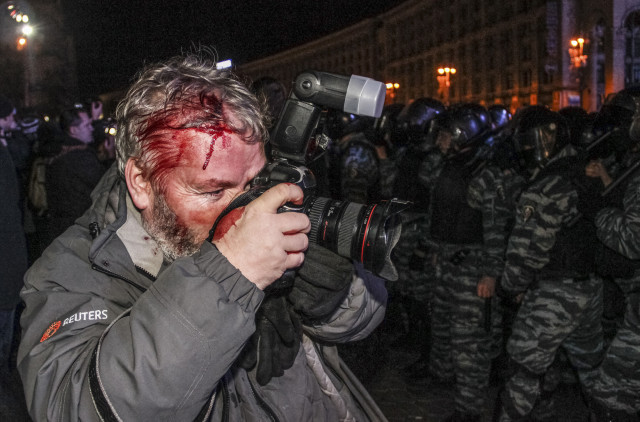
Wounded Reuters photographer Gleb Garanich, who was injured by riot police, takes pictures as riot police block protesters during a scuffle at a demonstration in support of EU integration at Independence Square in Kiev November 30, 2013. The International News Safety Institute says 58 journalists or media staff have been killed while working in 2014 alone. REUTERS
Reporters Without Borders (RSF) this week announced a journalist was killed covering the offensive against the Iran-backed Shiaa government of Nouri Al-Maliki in Iraq by the Islamic State in Iraq and Syria (ISIS, also known as ISIL) and other Iraqi Sunni groups.
Khaled Ali Hamada, an Al-Ahad TV cameraman died Monday in the eastern governate of Diyala and Al-Ahad TV reporter Moataz Jamil Hassan was badly injured. Based in Diyala, Al-Ahad TV is linked to the Shiite Islamist group Kutla Asaib Ahl Al-Haq.
Reporter Minas Al-Souhil and his cameraman, covering events for the private Iraqi network Al-Sharqiya News, were meanwhile arrested by security forces in Baghdad this week, and the network’s Diyala correspondent, Halmi Kamal, was kidnapped and held by armed individuals in Baqubah (55 km northeast of Baghdad).
It’s a powerful reminder of the dangers of reporting in conflict zones, and as the Iraq crisis heats up, more and more international journalists will be headed there to cover events–including some of VOA’s best.
The International News Safety Institute (INSI) is offering these tips and reminders about staying safe in Iraq:
- Iraq is one of the world’s most dangerous places for reporters. Events are moving quickly, and kidnappings, bombs, targeted killings and improvised explosive devices (IEDs) are still a daily threat throughout the country and all out military conflict is now a real possibility between the Iraqi military, Shia militia groups and Sunni militants from ISIS.
- Foreign journalists are banned from entering Al-Anbar province without approval from the Iraq’s Ministry of Defense and the Anbar Operations Command Center. Don’t be adventurous; international and local journalists who aren’t carrying the right paperwork do get arrested in Iraq.
- That said, don’t consider Erbil and the north to be any safer than anywhere else in Iraq. The whole country is dangerous now, for reporters and non-.
- Plan your routes into and out of the country before going. Be ready for any emergency, including medical. You’re on your own.
- If you haven’t worked in a hostile or war zone before, take a hostile environment training course.
- Read up on military tactics and weapon systems, and carry appropriate protective gear.
- Understand that medical/emergency care may not be available, so have a basic understanding of trauma care.
- If you’re not familiar with weapons of war, check out this basic INSI guide to the types of weapons used in conflict, what kind of damage they can inflict and how to protect yourself:
